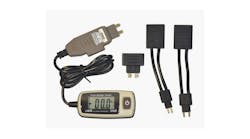DuPont today expressed disappointment in Daimler’s statement that it will postpone compliance with Europe’s Mobile Air Conditioning (MAC) Directive while it pursues a technology that reportedly will not be ready to implement for many years.
The MAC Directive, which is a central part of the European Union’s sustainability program and went into force Jan. 1, 2013, requires that automotive air conditioning systems in new model vehicles sold in the European Union use a refrigerant with a global warming potential (GWP) of less than 150. Failure to implement the MAC Directive immediately comes at a considerable cost in terms of greenhouse gases introduced into the environment. For example, delaying the MAC Directive until the start of 2015 would result in higher greenhouse gas emissions equivalent to putting 400,000 additional cars on the road.*
Automakers have had a number of years to identify a refrigerant for use in complying with the MAC Directive. Automakers from around the world evaluated a range of refrigerants as candidates for MAC Directive compliance, including HFO-1234yf and carbon dioxide. Among the available options, the consensus view was that HFO-1234yf is the most suitable alternative when considering performance, life-cycle climate performance, safety, implementation costs and industry readiness.
“Automakers conducted extensive testing, and concluded that HFO-1234yf is the best option overall,” said Thierry Vanlancker, president, DuPont Chemicals & Fluoroproducts. “This involved extensive testing in real-life conditions, and evaluations conducted at independent, third-party laboratories. The results consistently showed that the refrigerant is highly unlikely to ignite and that ignition requires an extremely unlikely combination of exceptional conditions that are not consistent with real world collision scenarios.”
All industry-sponsored risk assessments have determined that HFO-1234yf can be used safely and that neither flammability nor hydrogen fluoride formation present a significant safety concern. In fact, a presentation co-authored by Daimler and presented in September 2012 in Germany, concluded that "R1234yf equipped vehicles are as safe as those using R134a – for occupants, mechanics, first emergency responders and fire fighters."
The automotive industry has established recommendations to enable the safe use of HFO-1234yf. DuPont is not aware of any documented cases of actual vehicle crash tests where HFO-1234yf ignited. Further, another German car manufacturer was recently quoted in a news report as saying that the results of their testing of HFO-1234yf have been positive without exception.
“Safety is a core value of DuPont and is central to everything we do,” added Vanlancker. “We certainly put safety as the first priority and we have a high degree of confidence that HFO-1234yf can be safely used as an automotive refrigerant. We remain committed to work with Daimler to overcome their current technical concerns.”
Using carbon dioxide as an automotive refrigerant reduces fuel efficiency of vehicles and this becomes an overriding factor in the warmer geographies of the world. Further, use of carbon dioxide as an automotive refrigerant involves the potential for passengers to breathe unacceptable levels of carbon dioxide in the event of a refrigerant leak.
DuPont co-developed HFO-1234yf in response to Europe’s MAC Directive, and the company markets and sells the refrigerant under the name Opteon™ YF. DuPont applies its scientific expertise to creating sustainable solutions that make a difference in the world and our commercialization of Opteon™ YF is a great example of this. Opteon™ YF is a scientific breakthrough that has a 99.7 percent lower global warming potential than the refrigerant it was developed to replace, and has potential to reduce emissions equivalent to using billions fewer liters of fuel every year.
DuPont (NYSE: DD) has been bringing world-class science and engineering to the global marketplace in the form of innovative products, materials, and services since 1802. The company believes that by collaborating with customers, governments, NGOs, and thought leaders we can help find solutions to such global challenges as providing enough healthy food for people everywhere, decreasing dependence on fossil fuels, and protecting life and the environment. For additional information about DuPont and its commitment to inclusive innovation, please visit www.dupont.com.

